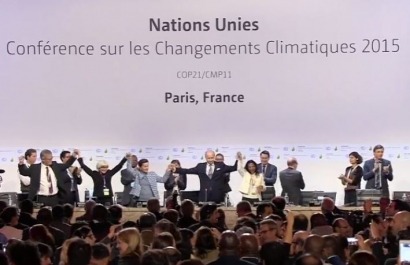
The agreement was adopted after 13 days of intense bargaining in a suburb outside of Paris, and calls for sweeping changes in how energy is produced and ultimately put to use.
The deal, which has 196 signatories, commits all of the participating countries to reduce their reliance on fossil fuels, and ultimately to rely on an energy mix that includes higher percentages of wind, solar, geothermal, ocean energy and biofuels.
"History will remember this day," UN Secretary General Ban Ki-moon after the plan was ratified.
“The Paris agreement on climate change is a monumental success for the planet and its people,” he said.
French Foreign Minister Laurent Fabius, who presided over the talks just a month after the Paris terror attacks, was equally pleased, describing the agreement as a historical turning point.
That theme was picked up by US President Barack Obama, who said from the White House that "the Paris agreement establishes the enduring framework the world needs to solve the climate crisis.
"It creates the mechanism, the architecture, for us to continually tackle this problem in an effective way," the president continued, adding, "I believe this moment can be a turning point for the world," Obama said, calling the agreement "the best chance we have to save the one planet that we've got."
The agreement binds together pledges by individual nations to cut or limit emissions from fossil fuel burning, within a framework of rules that provide for monitoring and verification as well as financial and technical assistance for developing countries.
Its goal is to bring down pollution levels so that the rise in global temperatures is limited to no more than 2 degrees Celsius (3.6 degrees Fahrenheit) above preindustrial averages.
Delegates added language that expressed an ambition to restrict the temperature increase even further, to 1.5 degrees C, if possible.
Critics, however, say the agreement is short on specifics, including a concrete plan for how to enforce it or how improvements will be measured.
It also doesn't mandate how much each country must reduce its greenhouse gas emissions. Instead, each signatory will set its own goal -- the "nationally determined contribution" - and then explain how it plans to reach its goals.
The agreement requires that each signatory increase its greenhouse gas reduction goals over time, and beginning in 2018, each of the participating countries will have to submit a new plan every five years.
While it may not accomplish everything it could have -- this not being a perfect world -- the agreement is the first to commit all nations, regardless of their relative wealth, to limiting emissions of carbon dioxide and other greenhouse gases.
Speaking with reporters, the UN Secretary General suggested the accord should also be a clear signal to industry that the time has come to embrace a cleaner, more renewables-driven future, and develop the technologies and products to ensure it happens.
“Markets now have the clear signal to unleash the full force of human ingenuity,” Ban Ki-moon said.
Shortly afterwards, Adnan Z. Amin, Director-General of the International Renewable Energy Agency, released a statement that said in part, "The global community was united in voicing commitment for decisive, inclusive and coordinated action on climate change. The Paris Agreement provides a framework for international cooperation and sends a clear signal to all stakeholders to raise their ambition.
“The innovative approach of the Conference incorporated all of the ingredients for a positive outcome, setting the stage for decisive action moving forward. The Agreement establishes long-term vision for the deep reduction of global emissions and the imperative of decarbonising energy. The commitments submitted by countries in their Intended Nationally Determined Contributions demonstrate the centrality of renewable energy in national strategies. And the bold announcements made by private sector and other actors strengthened the meeting’s solution-focused theme.
“IRENA welcomes the Paris Agreement as a watershed for the global energy transition. Renewable energy has made remarkable progress in the last decade. Combined with energy efficiency, it provides an immediate, viable and affordable solution to the challenge of climate change. But to meet the ambition set forth in the Agreement, accelerating the deployment of renewable energy deployment across all sectors must start now. In January 2016, we will welcome global energy leaders at the 6th Session of the IRENA Assembly to move the Paris Agreement to the next phase, setting the global renewable energy agenda and establishing a blueprint for action to meet climate goals and set the world on a path to a sustainable energy future.”
For additional information:

